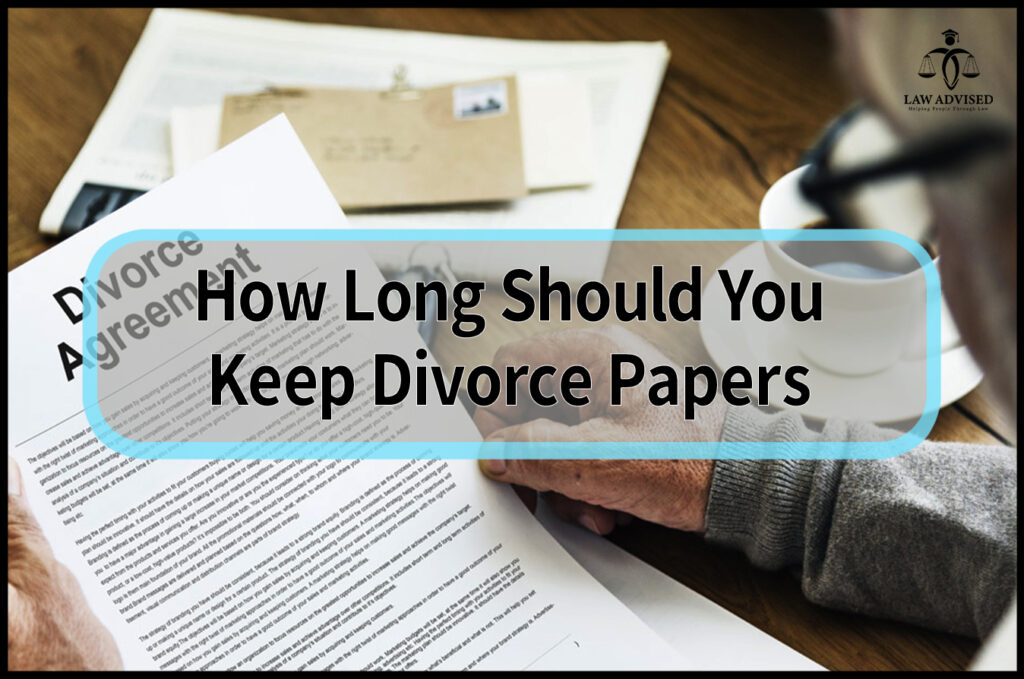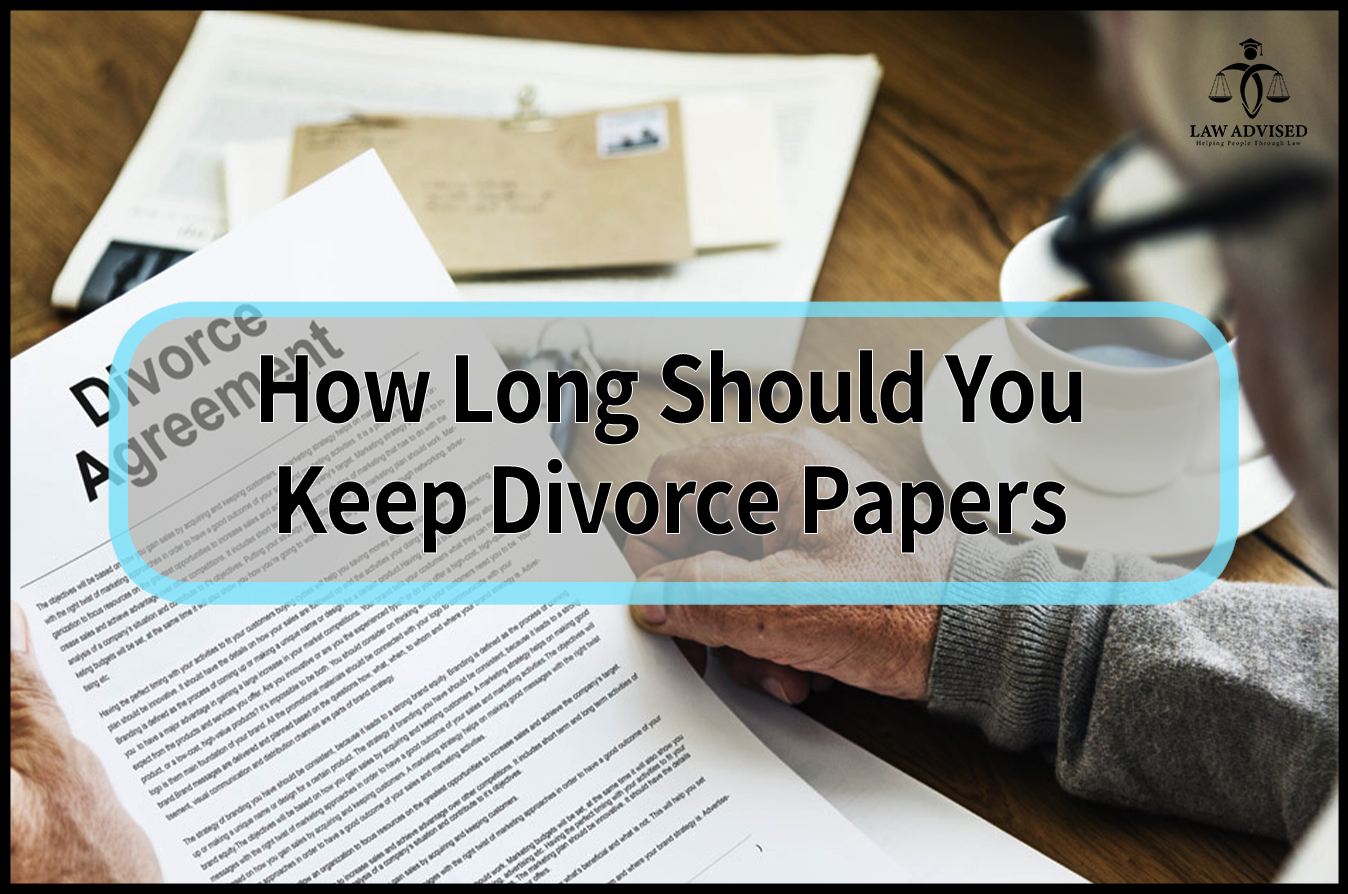Divorce papers should be kept for a minimum of 7 years as per IRS guidelines. After this period, it is generally safe to dispose of them.
Keeping these records for the required time can help in various legal matters and serve as proof of divorce if needed in the future. Additionally, ensuring the safe storage of divorce papers is essential to protect personal information and sensitive details.
Divorce is a significant life event that requires careful handling of legal documents. Many people wonder how long they should keep their divorce papers. It is important to understand the recommended duration for retaining these records, as well as the potential benefits and risks associated with holding onto them. We will discuss the appropriate timeframe for retaining divorce papers, IRS guidelines, the importance of keeping these records, and tips for safe storage. By understanding these factors, individuals can make informed decisions about managing their divorce paperwork. So, let’s dive in and explore how long you should keep divorce papers.
Why It’s Important To Keep Divorce Papers
Divorce papers are important legal documents that should be kept for a specific period of time. These papers hold legal significance as they serve as proof of the termination of a marriage. One of the main reasons to keep divorce papers is for future reference. They contain crucial information regarding the terms of the divorce, such as alimony, child custody, and property division. In the event of any disagreements or disputes in the future, having access to these documents can provide clarity and resolve legal matters more efficiently.
Moreover, divorce papers act as proof of divorce in various situations. They may be required when updating legal documents, applying for government benefits, or dealing with financial matters. As such, it is highly recommended to store divorce papers in a safe and easily accessible place for the appropriate period of time.
Factors To Consider When Deciding How Long To Keep Divorce Papers
When deciding how long to keep divorce papers, there are several factors to consider. One important factor is the statute of limitations for legal actions. Different jurisdictions have different time limits for bringing legal actions related to divorce, so it’s crucial to know and adhere to the specific statute of limitations in your area.
Another consideration is the requirements for financial and property matters. Divorce papers often contain important information and documentation related to the division of assets and debts, spousal support, and other financial matters. It’s wise to keep these papers for a significant period, especially if there are ongoing financial obligations or potential disputes.
Additionally, children and custody-related considerations may influence how long you should keep divorce papers. Papers related to child custody, visitation rights, and support are crucial for ensuring the best interests of the children involved. It’s essential to retain these papers until the children come of age or until there are no longer any legal obligations or potential conflicts.
In conclusion, determining how long to keep divorce papers depends on various factors such as the statute of limitations, financial requirements, the presence of children, and custody-related matters. It’s prudent to consult with legal professionals to make informed decisions regarding the retention of these important documents.
Expert Advice On Keeping Divorce Papers
When it comes to keeping divorce papers, legal professionals recommend taking certain steps for storage and retrieval. Organizational tips can help ensure that important documents are safely kept and easily accessible when needed. It is important to create a designated storage system, whether it be using a filing cabinet, folders, or binders, to keep all the divorce papers together. It is also advisable to label and categorize the documents, such as by date, type, or importance, to facilitate easy retrieval.
Another recommendation is to digitize the divorce papers and store them on a secure, password-protected device or cloud storage. This helps in avoiding physical damage or loss of papers and provides an additional backup. By following these expert suggestions, you can maintain the integrity and accessibility of your divorce papers.
Determining The Appropriate Timeframe To Keep Divorce Papers
When determining the appropriate timeframe to keep divorce papers, it is essential to understand the laws and regulations specific to your state. Each state may have different requirements regarding the length of time these documents should be retained. Personal circumstances and preferences should also be taken into consideration.
Some individuals may prefer to keep divorce papers for a longer period for various reasons, such as potential legal disputes or reference purposes. Balancing the need for accessibility and privacy is crucial. While it is important to have these documents readily available if needed, it is also crucial to protect sensitive information.
Safekeeping And Storage Options For Divorce Papers
When it comes to safekeeping and storing divorce papers, there are several options available to ensure their security. Secure home storage solutions provide a convenient and readily accessible way to keep your documents within reach. Utilizing a fireproof and waterproof safe or lockable filing cabinet can provide protection from physical damage and unauthorized access.
Off-site storage facilities offer an alternative for those who prefer to keep their divorce papers outside of the home. These facilities provide temperature and humidity-controlled environments, ensuring the longevity of your important documents. It is important to choose a reputable facility that offers security measures such as surveillance cameras and restricted access.
Digital storage platforms and cloud services offer a modern approach to storing divorce papers. Scanning and uploading your documents to a secure online platform or cloud storage can provide both accessibility and protection. Ensure that you choose a reliable and encrypted platform that guarantees the privacy and security of your data.
How To Dispose Of Divorce Papers Properly
Knowing how long to keep divorce papers is essential for maintaining organization and protecting personal information. When it comes to the proper disposal of divorce papers, shredding, and secure disposal methods should be followed. Consulting legal professionals can provide guidance on the specific requirements for disposing of legal documents, including divorce papers. They can advise on the recommended retention period and the appropriate methods for disposing of the papers securely.
Proper disposal is important to ensure the protection of personal information. Divorce papers contain sensitive details that could be exploited if they fall into the wrong hands. By shredding the documents, you eliminate the risk of identity theft and unauthorized access to personal data. It is crucial to follow secure disposal methods, such as using cross-cut or micro-cut shredders, to destroy the papers completely.
Additional Tips For Managing Divorce Papers
When managing divorce papers, it is crucial to create a comprehensive filing system to keep all documents organized. This system should include separate folders or tabs for different types of documents, such as financial records, court orders, and correspondence.
Additionally, it is important to keep track of important dates and deadlines related to your divorce. This can be done using a calendar or reminder system to ensure that you meet all requirements and do not miss any key dates.
In complex cases, seeking professional assistance can be beneficial. A divorce attorney or legal service provider can help navigate the intricate aspects of the process and ensure that all paperwork is properly handled.
Final Thoughts And Expert Insights
Recap of key considerations and recommendations:
Experts emphasize the importance of maintaining organized divorce records. Not only do these documents hold significant legal importance, but they also serve as invaluable references for the future. By keeping your divorce papers in order, you can simplify any legal or financial transactions related to your previous marital status.
Encouragement to take necessary steps in safeguarding divorce papers should not be taken lightly. Consider creating digital copies of all relevant paperwork and storing them securely. Additionally, it is wise to maintain hard copies in a safe place, such as a fireproof lockbox.
Frequently Asked Questions Of How Long Should You Keep Divorce Papers

How Long Should You Keep Divorce Papers?
You should keep divorce papers for at least 10 years, as they may be needed for legal or financial purposes.
Why Is It Important To Keep Divorce Papers?
Keeping divorce papers is important as they serve as a legal record of your divorce and may be required for future reference or disputes.
What Should I Do If I Lose My Divorce Papers?
If you lose your divorce papers, you should contact the court where the divorce was finalized to obtain copies or certified copies.
Can I Dispose Of Divorce Papers After A Certain Time?
While there is no rule on when you can dispose of divorce papers, it is recommended to keep them for a minimum of 10 years.
What Happens If I Don’t Keep My Divorce Papers?
If you don’t keep your divorce papers, you may face difficulties in proving your marital status or settling future legal matters.
Are Digital Copies Of Divorce Papers Acceptable?
Yes, digital copies of divorce papers are generally acceptable as long as they are properly stored, secured, and easily accessible.
Can I Store Divorce Papers Electronically?
Yes, you can store divorce papers electronically using cloud storage or external drives, ensuring they are backed up and easily retrievable.
What Other Documents Should I Keep Along With Divorce Papers?
Along with divorce papers, it is recommended to keep important documents such as marriage certificates, property deeds, and financial records.
Conclusion
It is essential to understand the importance of keeping divorce papers. By retaining these documents, you can protect yourself legally, keep a record of important information, and ensure smooth processes in the future. Remember to store them securely and consider digitizing them for easy access.
Stay organized and have all necessary paperwork readily available when needed. Taking these steps will provide peace of mind and aid in a seamless transition during and after a divorce.
Ismail Hossain is the founder of Law Advised. He is an Divorce, Separation, marriage lawyer. Follow him.





Leave a Reply